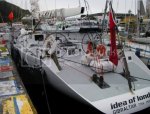Bajansailor
Well-Known Member
It is interesting to see that this Forum is becoming increasingly more cosmopolitan. We have forumites of foreign tongues, based in the UK, from overseas, English speakers native language and English speakers not native language.
Over the years we had forumites from USA, Australia, NZ, France, Norway, Spain, Finland, Netherlands, Ireland and I am sure there are a few more nationalities and foreign speakers who are using this forum.
We all have yachting as common interest. I wonder how many forumites based overseas (or multi-nationals living in the UK) are actively participating in this forum.
There are also a few in the Caribbean, including myself in Barbados, and the irrepressible Rum Pirate in St Kitts, about 400 miles north of us.
I personally like the British flavour of YBW, I hop into a few sailing forum from different countries (France, Italy, US, Spain, Brazil, sometimes Quebequois Canada): the passion and interests may be shared, but the approach to sailing is sometimes really really different from one sailing culture to the other, which makes things so interesting and often funny.
Long live heterocultural sailing
Absolutely!
And it is so nice to meet other forumites in person as well - I had the pleasure of having an impromptu 'eyeball QSO' (ham radio speak for a get together) with Roberto in Horta in the Azores almost 9 years ago, where we were coincidentally moored on the same dock.
I was very impressed then by Roberto's absolute fluency in multiple languages - at least 5 re all the different forums that you mention above?

